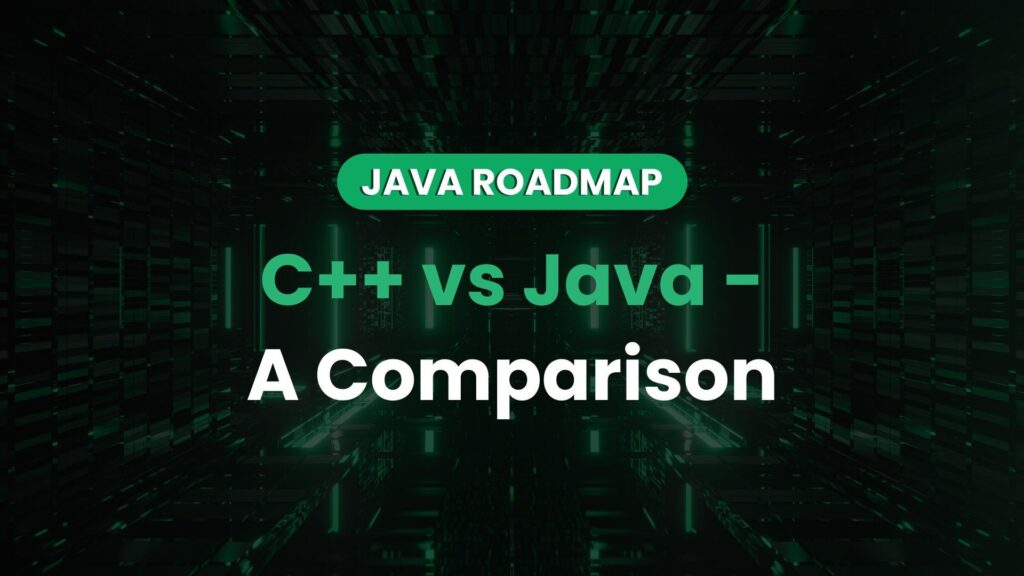Hello, fellow learners! Today, we’re going to compare two popular programming languages: C++ and Java. These languages are widely used and have their unique features and areas of application. So, let’s dive into the C++ vs. Java comparison!
| Factor | C++ | Java |
| Performance | C++ is a compiled language that provides direct access to hardware resources, making it suitable for applications that require high performance, such as games, operating systems, and embedded systems. | Java is an interpreted language that is slower than C++, but provides a JIT compiler that can optimise code at runtime, making it suitable for applications that require moderate performance, such as web applications and enterprise applications. |
| Memory Management | C++ provides manual memory management, which gives the programmer more control over memory usage, but is more prone to memory-related errors. | Java provides automatic memory management through a garbage collector, which is easier to learn and less prone to memory-related errors. |
| Platform Independence | C++ is a platform-dependent language, which means that C++ code needs to be compiled separately for each platform. | Java is a platform-independent language, which means that Java code can run on any platform that has a JVM installed. |
| Object-Oriented Programming | C++ and Java are both object-oriented programming languages that support classes, objects, and inheritance. C++ provides more low-level control over memory and hardware resources, while Java provides a more robust object-oriented programming model. | Java provides interfaces, abstract classes, and encapsulation, making it easier to write modular and reusable code. |
| Development Tools | C++ provides tools like Visual Studio, Code::Blocks, and Eclipse CDT, which offer basic features like syntax highlighting, code completion, and debugging. | Setting up the Java environment provides tools like Eclipse, NetBeans, and IntelliJ IDEA, which offer sophisticated features like code refactoring, debugging, and profiling. |
| Aspect | C++ | Java |
| Memory Management | Manual memory management with pointers | Automatic memory management (garbage collection) |
| Platform | Runs on multiple platforms | Platform-independent (Java Virtual Machine) |
| Performance | Offers high performance | Relatively slower performance |
| Object-Oriented Focus | Supports object-oriented programming | Strong emphasis on object-oriented programming |
| Exception Handling | Uses try-catch blocks for exceptions | Exception handling through try-catch-finally blocks |
| Multiple Inheritance | Allows multiple inheritance | Supports single inheritance and interfaces |
| Operator Overloading | Allows overloading of operators | Does not support operator overloading |
| Pointers | Supports pointers for direct memory access | No pointer support for enhanced security |
| Threading | Provides low-level threading capabilities | Offers built-in threading support |
| Game Development | C++ is often preferred for game development due to its high performance and low-level control over hardware resources. | Java is widely used in mobile game development, especially for Android platforms, thanks to its platform independence and easy integration with Android SDK. |
- Hello world in C++
#include <iostream>
int main() {
std::cout << "Hello, World!";
return 0;
}Output:
Hello World!- Hello World in Java
public class HelloWorld {
public static void main(String[] args) {
System.out.println("Hello, World!");
}}Output:
Hello, World!Examples:
- Performance: A game development company may choose C++ for developing high-performance games that require direct access to hardware resources, while a web development company may choose Java for developing web applications that require moderate performance.
- Memory Management: A company that develops operating systems may choose C++ for low-level memory manipulation, while a company that develops enterprise applications may choose Java for automatic memory management.
- Platform Independence: A company that develops mobile applications may choose Java for platform independence, while a company that develops desktop applications may choose C++ for platform-specific optimizations.
- Object-Oriented Programming: A company that develops reusable software components may choose Java for its robust object-oriented programming model, while a company that develops low-level algorithms may choose C++ for its low-level control over memory and hardware resources.
- Development Tools: A company that develops simple applications may choose C++ for its basic development tools, while a company that develops complex applications may choose Java for its sophisticated development tools.
Real-Life Scenario:
In the real world, both C++ and Java are used for a variety of applications. For example, C++ is used for developing high-performance games, operating systems, and embedded systems. Java is used for developing web applications, mobile applications, and enterprise applications. Both languages are used in the development of scientific and engineering applications, financial applications, and data analytics applications.
In conclusion, choosing between C++ vs Java depends on the specific requirements and constraints of your project. C++ is suitable for applications that require high performance and low-level memory manipulation, while Java is suitable for applications that require platform independence, automatic memory management, and robust object-oriented programming.
I hope this comparison between C++ and Java has provided you with a clearer understanding of the key differences and applications of these two languages. Remember, both C++ and Java have their strengths and are widely used in various industries. So choose wisely based on your project’s requirements and dive into the world of programming with confidence. Happy coding with C++ vs Java!

